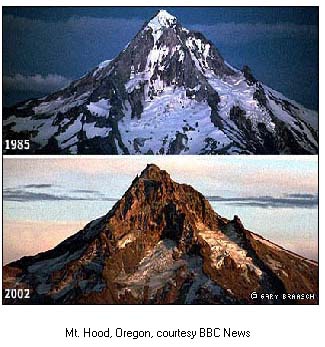Jan 06, 2026
Jan 06, 2026
sts are still sparring over whether global warming is real or if human beings indeed contribute to this phenomenon, there are several events that have occurred recently which really should serve as a wake up call for our planet. The polar ice caps in the Arctic, the ice caps in the Andes and Kilimanjaro are all melting at an alarming rate. The ice shelves off the coast of Antarctica have been breaking at an unprecedented rate; case in point is the Larsen-B ice shelf that disintegrated in 2002[1]. While the floating ice shelves may not contribute to a significant rise in the sea levels, it is the glaciers behind these shelves that pose the greatest threat. The permafrost in the peat bogs of Siberia that are covered with ice and snow has started to melt for the first time in 11,000 years since the last Ice age.[2] Ross Gelbspan, a Pulitzer prize winner and author of two books, 'The Heat is on' & 'Boiling Point'[3],[4], strongly believes that the climate crisis is far from just an environmental issue, but rather something that profoundly affects civilizations. When Mark Lynas[5], author of 'High Tide', visited the mountains in Peru several years since he had first been there as a child with his father, he was appalled at what was in store for him. The glaciers that covered the mountains were gone, simply vanished! Just in the last few weeks, we have had an unprecedented freak Cloudburst in Mumbai that dumped 37 inches of rain in a single day causing immense damage that the city is yet to recover from. And then there were floods in parts of Europe where people had to be airlifted from 18th century homes while fires ravaged in southern Europe. And finally, the unbelievable damage that the Hurricane has caused to the southern coastline of the US. Sir David King, the British Government's chief scientific adviser, has pointed out that global warming may be responsible for the devastation caused by Hurricane Katrina[6] One of the often less reported effects of global warming is the Gulf Stream that carries warm, salty waters from the tropics to the North. As the water cools its density increases, causing it to sink to the bottom of the ocean floor and these cooler currents then makes it way slowly back to the South. This helps maintain warm summers in Europe and other parts of the North. However as the glaciers melt and mix with the ocean waters, it gets diluted and drops down to the bottom rather slowly causing the currents to move slowly back to the south. What can you and I do to ensure that we contribute in a positive way to slow down the effects of global warming. Here are a few tips'. Turn off your electronics such as your PC, VCRs, DVDs etc when not in use. Whenever possible, walk, bike, carpool or use mass transit. Recycle cans, bottles, plastic, cardboard and newspapers. Switch from hot to warm or cold water for laundry Switch standard light bulbs to fluorescents -Run the dishwasher only when it is full. We need to make sure that the world is a better place to live so that future generations may avoid The Day After Tomorrow.
 This has been heralded as a tipping point in the global warming phenomenon, because once the permafrost disappears all the methane that is currently trapped (estimated to be about 70 billion tons) in it will be released. Methane may be converted to carbon dioxide (CO2), which would then add to the CO2 levels in the atmosphere. Alternatively if the methane gets released intact, it would be more potent than CO2 as a green house gas!
This has been heralded as a tipping point in the global warming phenomenon, because once the permafrost disappears all the methane that is currently trapped (estimated to be about 70 billion tons) in it will be released. Methane may be converted to carbon dioxide (CO2), which would then add to the CO2 levels in the atmosphere. Alternatively if the methane gets released intact, it would be more potent than CO2 as a green house gas!
11-Sep-2005
More by : Subra Narayan

|
This is a very helpful post that aids in the alleviation of climate change. I wonder if humans are able to satisfy the proper choices to avoid this disaster from happening. |